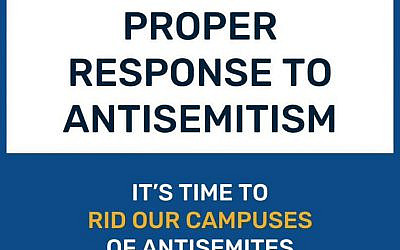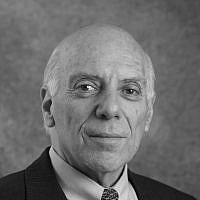Fueling Antisemitism While Preaching Inclusivity!
 As someone deeply committed to the principles of justice and academic freedom, I find the current wave of antisemitism on college campuses both alarming and distressingly familiar. Despite public assertions of commitment to diversity and inclusivity, many prestigious institutions appear to be more concerned with public relations and political appeasement than with confronting the genuine threats faced by Jewish students.
As someone deeply committed to the principles of justice and academic freedom, I find the current wave of antisemitism on college campuses both alarming and distressingly familiar. Despite public assertions of commitment to diversity and inclusivity, many prestigious institutions appear to be more concerned with public relations and political appeasement than with confronting the genuine threats faced by Jewish students.
It’s time to confront an uncomfortable truth: universities’ responses to the rising tide of antisemitism are often superficial and ineffective. While these institutions might launch public awareness campaigns or host interfaith dialogues, these actions frequently serve as little more than window dressing. They do little to address the underlying attitudes or to change the campus culture that makes such hatred permissible in the first place. This is not a call to silence free speech but to challenge hateful speech with better, more persuasive speech based on truth and justice.
Legally, universities have an obligation under federal and state anti-discrimination laws to protect all students from harassment and discrimination. Ethically, they are supposed to be bastions of learning and understanding, committed to fostering an environment where ideas can be exchanged freely and safely. However, when it comes to protecting Jewish students, their actions—or lack thereof—speak louder than their policies. There is often a hesitancy to take robust action against antisemitic incidents, perhaps for fear of political backlash or accusations of stifling criticism against Israeli policies. This is a gross misapplication of the principles of academic freedom and a moral failure to protect vulnerable students.
The influence of geopolitical biases on university policies cannot be overstated. There is a troubling tendency within some academic circles to conflate legitimate criticism of Israeli government policies with outright antisemitic statements and actions. This conflation is dangerous, blurring the lines between political critique and racial hatred. Universities must be vigilant in maintaining this distinction, ensuring that their campuses do not become grounds for spreading misinformation and fostering hostility towards Jewish students.
Case in point, the recent campus visit by Representative Ilhan Omar, funded by taxpayers, raises several contentious issues, particularly when considering the presence of her daughter—who was reportedly suspended—and the exclusion of a Jewish professor from the same campus. The use of public funds for such a visit, especially under these circumstances, might be seen as a problematic endorsement of one side of a divisive debate. This situation exemplifies potential double standards in campus policies; Omar’s daughter was allowed on campus despite her suspension, whereas a Jewish professor faced restrictions, presumably for safety reasons in a hostile environment. This disparity in treatment raises serious concerns about fairness, bias, and the undermining of academic freedom and freedom of speech. Such incidents call for a need for transparency and equality in enforcing campus policies, ensuring that educational institutions remain places for balanced discourse and learning, free from political bias.
What is needed now is not more lip service to the ideals of inclusivity but a real, concrete commitment to action. Universities must enforce their anti-discrimination policies rigorously and without prejudice. They should ensure that educational programs about antisemitism and its historical and contemporary manifestations are accurate and profound, not just tick-box exercises.
Faculty and administrators must be trained to recognize antisemitism in all its forms, from overt acts of aggression to subtler, insidious manifestations in classroom discussions and on social media. Moreover, there must be clear and immediate consequences for antisemitic actions on campuses. Only through such measures can universities hope to restore the trust of their Jewish students and ensure their safety and well-being.
This is not just about protecting Jewish students—it’s about preserving the integrity and the foundational values of our educational institutions. It’s about ensuring that universities remain places where all students, regardless of their background or beliefs, can feel safe and supported. The time for real change is now.



